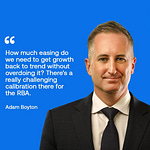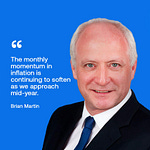Global stocks fall the most since March 2020 after Donald Trump’s Liberation Day tariff shock. The Aussie and Kiwi dollars slump after China retaliates. And ANZ Research now sees the RBA cutting three times this year, rather than once.
In our bonus deep dive interview, ANZ’s Chief Economist for Southeast Asia and India, Sanjay Mathur, analyses the economic effects on India of the 26% tariff rate put on its exports to the United States.
5 things to know in 5 minutes:
Global stocks fell the most last week since the Covid slump of March 2020, after Donald Trump first put higher than expected tariffs on all US imports, and then China retaliated in kind on Friday night with its own 34% tariffs on US imports. The S&P 500 fell another 5.6% on Friday, taking its losses since the Liberation Day tariff announcement to 10.2%, the fourth biggest two-day fall in history behind the 1929 Crash, 1987 crash and the March 2020 slump. ANZ’s Head of G3 Economics Brian Martin said China’s retaliation hit market sentiment.
US Federal Reserve Chairman Jerome Powell worsened the slump on Friday night by saying the tariffs were worse than expected and would both slow economic growth and increase inflation, which meant the Fed would take a wait and see approach, rather than cutting immediately.
Brian says the sharp selloff at the end of last week, in combination with the effects on company earnings of tariffs, risks creating some negative feedback loops in markets.
The Aussie and Kiwi dollars also fell sharply on Friday night, seen as currencies sensitive to risk and vulnerable to any hit to growth in China. The Aussie fell 4.6% to 60.36 USc and the Kiwi fell 3.4% to 55.95 USc. ANZ’s Head of FX Research Mahjabeen Zaman said last night that markets will be watching the People’s Bank of China closely today.
ANZ Research has changed its call on how many rate cuts it expects from the Reserve Bank of Australia, from one 25 basis point cut in August, to three cuts this year, in May, July and August, says ANZ’s Head of Australian Economics Adam Boyton.
Cheers,
Bernard
PS: Catch you tomorrow with on with more on that RBA call change.














